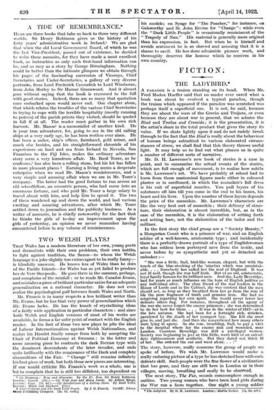TWO WELSH PLAYS.t
THAT Wales has a modern literature of her own, young poets and dramatists with their own problems, their own battles to fight against tradition, the Saxon—to whom the Welsh language is a joke slightly too extravagant to be really funny— is blissfully unaware. He knows less of Wales than he does of the Pacific Islands—for Wales has as yet failed to produce her de Vere Stacpoole. He goes there in the summer, perhaps, and complains of the rainfall : or he reads Mr. Caradoc Evans, -and mistakes a piece of brilliant particular satire for an adequate generalization on a national character. He does not even _realize the psychological gulf between South Wales. and North.
Mr. Francis is in many respects a less brilliant writer than Mr. Evans, but he has that very power of generalization which Mr. Evans lacks. He has the knack of crystallizing ideas of a fairly wide application in particular characters : and since both Welsh and English versions of most of his works are available, he forms a far safer point of contact with the English reader. In the first of these two new plays he pits the ideal of Labour Internationalism against Welsh Nationalism, and makes his Hamlet finally escape from both by accepting the Chair of Political Economy at Swansea : in the latter and more amusing piece he contrasts the dark Iberian type with the dominant descendants of the later invader, and ends quite brilliantly with the renaissance of the Dark and complete discomfiture of the Fair. " Change " still .remains infinitely his best piece of work, but both these new pieces are interesting. If one would criticize Mr. Francis's work as a whole, one is led to complain that he is still too diffident, too dependent on • (1) Memories : Wise and Otherwise. By the Rt. Hon. Sir Henry Robinson. London : Cassell. [168.]—(2) Wide Seas and Mang Lands. By Arthur Mason. London : Cape. [7s. Od.]—(3) Recollections of a Rolling Stone. By Basil Toler. London : Hurst and Blackctt. (16s.] t Cross-Currents and The Dark Little People. By J. 0. Francis. Cardiff Educe- ; Mous& -Publishing Company. [21r; Ott each.]
his models ; on Synge for " The Poacher," for instance, on Galsworthy and St. John Ervine for " Change ": while even the "Dark Little People" is occasionally reminiscent of the " Tragedy of Nan." His material is generally more original than his expression, in fact. But when he is hiniself and avoids sentiment he is so shrewd and amusing that it is a shame to cavil. He has done admirable pioneer work, and thoroughly deserves the honour which he receives in his own country.










































 Previous page
Previous page